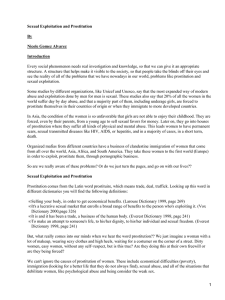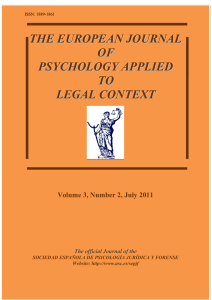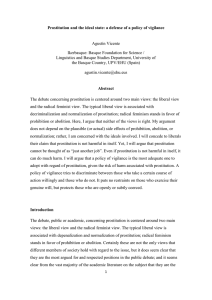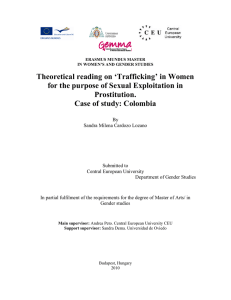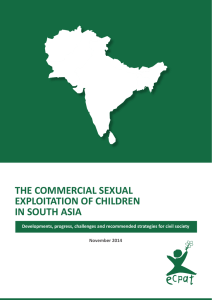The existence of child sexual exploitation appears to be relatively
Anuncio
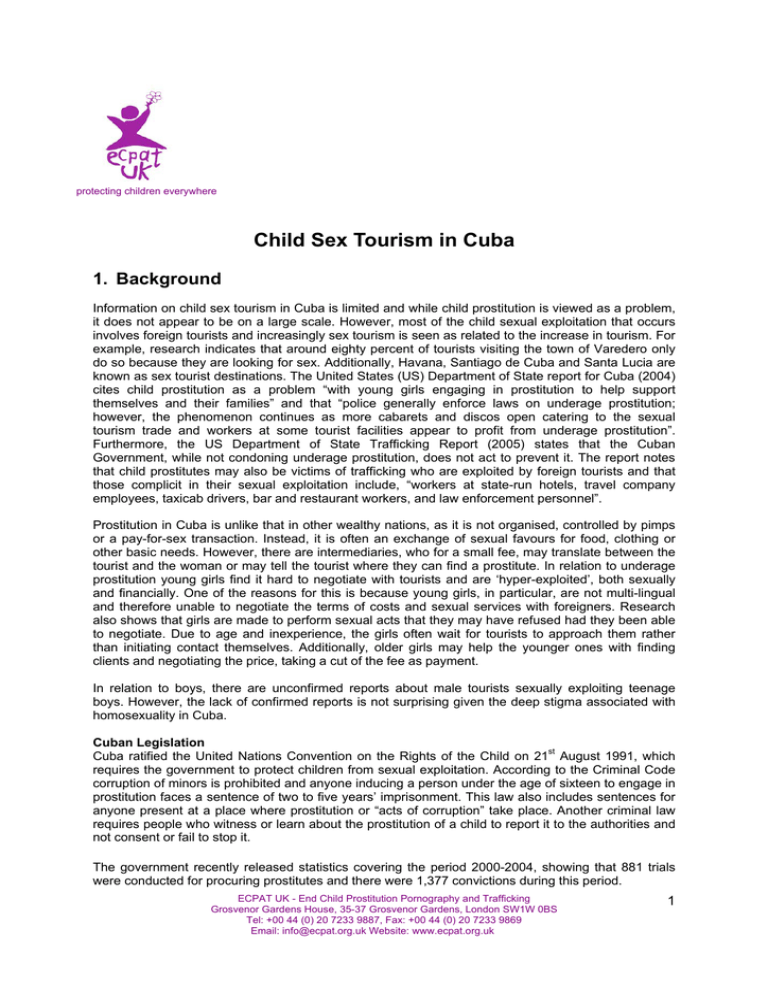
protecting children everywhere Child Sex Tourism in Cuba 1. Background Information on child sex tourism in Cuba is limited and while child prostitution is viewed as a problem, it does not appear to be on a large scale. However, most of the child sexual exploitation that occurs involves foreign tourists and increasingly sex tourism is seen as related to the increase in tourism. For example, research indicates that around eighty percent of tourists visiting the town of Varedero only do so because they are looking for sex. Additionally, Havana, Santiago de Cuba and Santa Lucia are known as sex tourist destinations. The United States (US) Department of State report for Cuba (2004) cites child prostitution as a problem “with young girls engaging in prostitution to help support themselves and their families” and that “police generally enforce laws on underage prostitution; however, the phenomenon continues as more cabarets and discos open catering to the sexual tourism trade and workers at some tourist facilities appear to profit from underage prostitution”. Furthermore, the US Department of State Trafficking Report (2005) states that the Cuban Government, while not condoning underage prostitution, does not act to prevent it. The report notes that child prostitutes may also be victims of trafficking who are exploited by foreign tourists and that those complicit in their sexual exploitation include, “workers at state-run hotels, travel company employees, taxicab drivers, bar and restaurant workers, and law enforcement personnel”. Prostitution in Cuba is unlike that in other wealthy nations, as it is not organised, controlled by pimps or a pay-for-sex transaction. Instead, it is often an exchange of sexual favours for food, clothing or other basic needs. However, there are intermediaries, who for a small fee, may translate between the tourist and the woman or may tell the tourist where they can find a prostitute. In relation to underage prostitution young girls find it hard to negotiate with tourists and are ‘hyper-exploited’, both sexually and financially. One of the reasons for this is because young girls, in particular, are not multi-lingual and therefore unable to negotiate the terms of costs and sexual services with foreigners. Research also shows that girls are made to perform sexual acts that they may have refused had they been able to negotiate. Due to age and inexperience, the girls often wait for tourists to approach them rather than initiating contact themselves. Additionally, older girls may help the younger ones with finding clients and negotiating the price, taking a cut of the fee as payment. In relation to boys, there are unconfirmed reports about male tourists sexually exploiting teenage boys. However, the lack of confirmed reports is not surprising given the deep stigma associated with homosexuality in Cuba. Cuban Legislation Cuba ratified the United Nations Convention on the Rights of the Child on 21st August 1991, which requires the government to protect children from sexual exploitation. According to the Criminal Code corruption of minors is prohibited and anyone inducing a person under the age of sixteen to engage in prostitution faces a sentence of two to five years’ imprisonment. This law also includes sentences for anyone present at a place where prostitution or “acts of corruption” take place. Another criminal law requires people who witness or learn about the prostitution of a child to report it to the authorities and not consent or fail to stop it. The government recently released statistics covering the period 2000-2004, showing that 881 trials were conducted for procuring prostitutes and there were 1,377 convictions during this period. ECPAT UK - End Child Prostitution Pornography and Trafficking Grosvenor Gardens House, 35-37 Grosvenor Gardens, London SW1W 0BS Tel: +00 44 (0) 20 7233 9887, Fax: +00 44 (0) 20 7233 9869 Email: info@ecpat.org.uk Website: www.ecpat.org.uk 1 UK Legislation While British tourists who commit sexual offences in Cuba can be prosecuted in that country, they can also be prosecuted in the UK for crimes committed in Cuba. Under the UK Sexual Offences Act, 2003, article 72, persons can be prosecuted for a crime that is viewed as a criminal offence in both countries. Therefore, if a tourist sexually abuses a child in Cuba, they can be tried in the UK since both countries legislate against this offence. This Act covers crimes committed by a traveller against either a travelling child companion or a child living in the country, but not detected until a persons return to the UK. Additionally, the Sexual Offences (Conspiracy and Incitement) Act, 1996, allows for the prosecution of those who conspire to commit a sexual offence outside the UK, or incite someone else to commit the offence. Therefore, if one person either helps or pushes another to commit the offence, they too can be prosecuted in the UK. 2. Who are the children and aspects of vulnerability? The system of obtaining prostitutes through an intermediary rather than a pimp relies on individual ‘initiative’ rather than being an organised system of recruitment. However, it does mean that young girls from the more economically desperate inland towns are being encouraged to migrate to tourist centres to prostitute themselves. These ‘new’ girls are especially vulnerable since they have less experience and are often without either language skills or knowledge about prostitution. It has been observed that there are more black prostitutes than ‘mixed’ or white in the known sex tourism destinations and that Black Cubans face discrimination on the basis of their race. Based on various pieces of research, evidence shows that children and adults are forced into prostitution in order to support their families. As well as economic hardship, the dollar/ peso economy forces many to find ways to access dollars. Research has found that ”resolving endless shortages in any household has involved gaining access to dollars through one means or another, as hard currency has become increasingly essential in determining one’s standard of living and social status”. While remittances from overseas help some to survive, others have had to be creative in searching for dollars, using some form of jineterismo (a broad range of activities related to tourist hustling). However, it must be noted that although the dollar became legal in 1993 this was revoked in October 2004. It is as yet unknown as to how this will affect child sex tourism. While many people migrate to tourist areas for work, a chronic shortage of accommodation and the fact that only residents are entitled to it leaves migrants vulnerable. Additionally, renting is illegal so migrants may be forced to pay high rents to landlords who illegally rent out their rooms. This can lock migrants into situations of exploitation as they earn money in any way possible to pay for the rent, which may include prostitution. Thus migrant females (girls aged fourteen- and fifteen-years-old) are in a particularly vulnerable position and end up being exploited by both the landlords and sex tourists. In contrast females with the right to reside in a tourist area have, to some extent, greater control and choice over the sexual services provided. 3. Who are the abusers? Cuba attracts men who wish to have sex with prostitutes, whether they are over or less than eighteenyears of age. Although researchers have been unable to confirm pre-teen prostitution, “sexual access to girls between the ages of fourteen and sixteen is not difficult to attain, and girls between sixteen and eighteen are very accessible”. Most of the sex tourists justify their actions by denying their own responsibility. The two main reasons they cite are that male sexuality is a biological need that they should not be denied and a racist belief in the Cuban culture and people as being sexually uninhibited. Researchers have found that men are attracted to the idea of sexual acts that may be taboo in their own countries. Some men feel that they are helping the women/girls by providing for things they need. Other researchers have distinguished between the Macho Man, who is looking for a quick sexual encounter with many different women/girls, ECPAT UK - End Child Prostitution Pornography and Trafficking Grosvenor Gardens House, 35-37 Grosvenor Gardens, London SW1W 0BS Tel: +00 44 (0) 20 7233 9887, Fax: +00 44 (0) 20 7233 9869 Email: info@ecpat.org.uk Website: www.ecpat.org.uk 2 and the Mr Average and Right-On Backpackers who prefer to have a longer relationship with a female and deny the economic basis of their relationship. In July 2003 a fifty-three-year-old Canadian man was sentenced to ten years in prison for the sexual abuse of a thirteen-year-old girl. Another Canadian man was sentenced to twenty-five years in prison for the sexual abuse of a fifteen year old, although he maintains his innocence. Much of the literature points to Canadians as being high on the list of offenders. In research done by O’Connell Davidson et al (1995), out of twenty-four of the men interviewed, twelve were Canadian, two were British Canadian and two Italian Canadian. Another four were British, although two were British Canadian (as above) and one was Swedish British. According to Fernardez, in the late 1990s the majority of tourists came from Italy, Canada, Spain, France and Germany. 4. How is the travel industry involved? Prostitution relating to tourism is not new in Cuba. Before the revolution of 1959 and the dismantling of the tourism industry, it is estimated that nearly 150,000 prostitutes worked in Cuba with 3000 pimps. In 1957, 350,000 tourists visited Cuba, with the majority from the USA. With the ‘closure’ of the tourism industry, the former prostitutes were placed into rehabilitation schemes to enable them to become part of ‘productive society’. However, the 1980s began to see the return of tourists, and in 1982, 200,000 tourists visited. Between 1990 and 1998 the figure grew from 340,000 to 1.4 million. With the influx of tourists came the dollar, enabling the Cubans to see the difference between their economic hardship and the decadence of the tourists. According to the US Trafficking in Persons report (2004), “Cuba’s tourist industry is heavily dominated by state companies, and government employees tolerate corrupt practices that facilitate this sexual exploitation, sometimes even making state-run facilities available for underage prostitution”. In particular, the town of Vadero is well known for police corruption; with police regularly bribing prostitutes and ignoring the sexual exploitation perpetrated by tourists. It is evident from the literature that prostitution in Cuba, of either children or adults, is perpetuated and fuelled by tourists. However, there is little literature on how the Cuban Government or tourism industry is working to protect children abused by sex tourists and to prevent sex tourism. ECPAT UK - End Child Prostitution Pornography and Trafficking Grosvenor Gardens House, 35-37 Grosvenor Gardens, London SW1W 0BS Tel: +00 44 (0) 20 7233 9887, Fax: +00 44 (0) 20 7233 9869 Email: info@ecpat.org.uk Website: www.ecpat.org.uk 3
